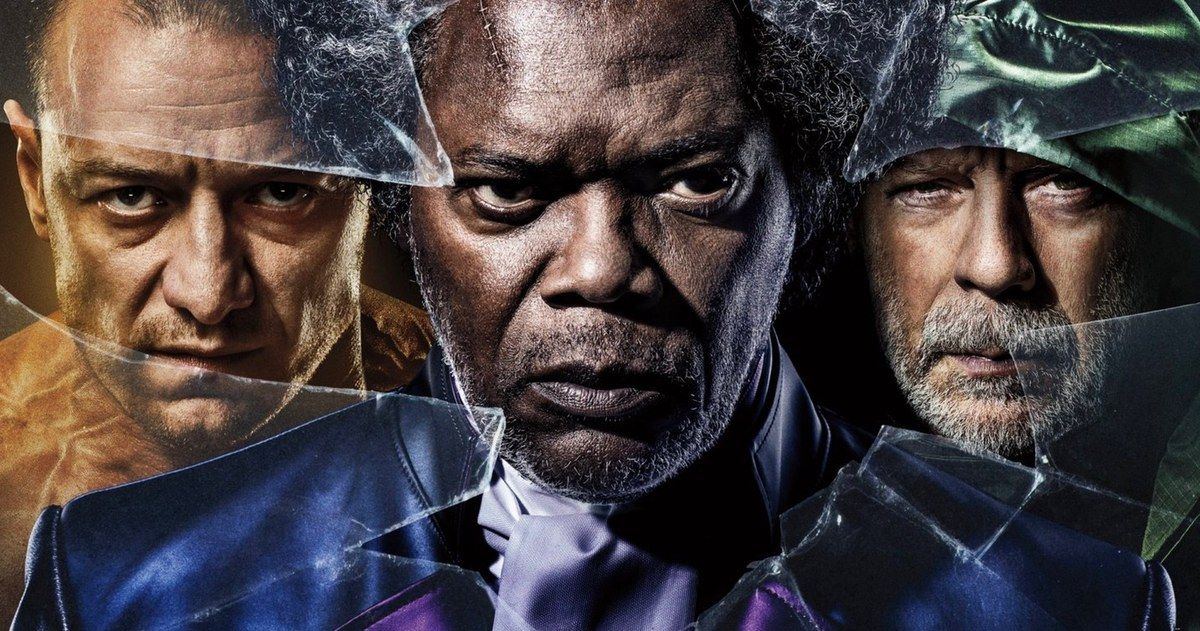Glass unfortunately suffers from the same flaws that bedevil M. Night Shyamalan's films. The finale to Unbreakable and Split is a convoluted jumble. It swings through multiple fake climaxes like bad late night erotica. The long runtime is exacerbated by the hammering in of comic mythology. Shyamalan refers to this premise ad nauseum. There are a few peaks to the valleys. James McAvoy continues to be sensational as The Horde. He holds an acting clinic, flawlessly switching between multiple personalities. The other leads aren't nearly as captivating. Glass held a lot of promise. Shyamalan was just too heavy handed in the delivery.
Glass opens three weeks after the events in Split. Kevin Wendell Crumb/The Horde is on a terror spree in Philadelphia. Law enforcement has the city under watch, but their attention isn't solely on the serial killer. Poncho'd vigilante David Dunn (Bruce Willis), branded "The Overseer" by internet fandom, is also on the radar. He's still guarding the streets. His son Joseph (Spencer Treat Clark) has grown into a skilled accomplice.
The Horde and Overseer have come to the attention of a powerful psychiatrist, Dr. Ellie Staple (Sarah Paulson). She specializes in patients with superhero delusions. Staple's brilliance nets her prized quarries. She can study them under one roof. But there's another addition to the bizarre menagerie. Elijah Price (Samuel L. Jackson) has been institutionalized for nineteen years. Seemingly catatonic, his brittle bones still hide an evil genius. Mr. Glass has waited a long time to prove that superheroes are indeed real.
Glass is overloaded with details. While Split is fresh in our memory, Shyamalan spends an inordinate amount of time on the events in Unbreakable. He needed to do a wiki update. An initial strong start quickly fizzles under a plodding plot barrage. Then we have painfully slow interactions. The action scenes become a lifeline before the audience drowns from boredom. Just when you think the film has reached a resolve, M. Night Shyamalan hits with twist after twist. The reveals become burdensome. Glass would have been so much better with a leaner edit and concise story. I'd love to see a fan version with the fat trimmed off.
Two performances carry all of the weight. James McAvoy needs more recognition for The Horde. Each character is physically distinct. The quick shift in personality is accompanied by stature. McAvoy's change in body language from a juvenile nine-year-old, to a prissy British woman, to the hulking Beast is remarkable. Sarah Paulson is also good. She spouts bad dialogue with earnest conviction. A lesser actress would have looked foolish with many of her lines. Paulson brings gravitas to every role. Bruce Willis and Samuel L. Jackson are understated in comparison. Mr. Glass is silent for half of the movie. He isn't nearly as diabolical or villainous as expected.
There are several plot holes I could drive a truck through. This is a spoiler free review so I'll address these problems using an example. Several of the key events in Glass are akin to a poorly choreographed fight scene. One character is in focus, while the others just mill around looking busy. Waiting their turn to jump into the scene on queue. Shyamalan uses facial close-ups as cover, like losing sight of a magician's other hand. It's a gimmick that doesn't work. I was constantly thinking, what are the other characters doing right now?
Glass disappoints, but is not unwatchable. It's not in the same league of the previous films. Unbreakable and Split held your interest firm throughout. Glass feels like a chore, tedious. That's a bummer, but there may be hope in the future. Glass certainly leaves a lot of unanswered questions. If Glass matches the success of Split, producer Jason Blum and Universal Pictures will have further stories in this plotline. Maybe Shyamalan recaptures greatness, fourth time's a charm.

